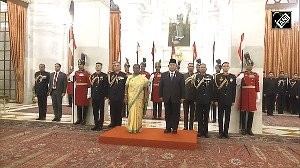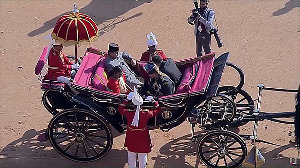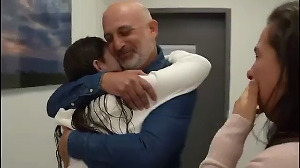
'He was getting weaker and weaker, but his mind was all there.'
'He was quite a strict father, in many ways... He was quite a strict person, not as liberal as it was made out to be.'
Rahul Singh, editor and columnist, reveals the Khushwant Singh few knew.
I have read some of the obituaries. They were all pretty good. Bachi (Karkaria, columnist) wrote a nice piece, and various other people.
Sadia Dehlvi (columnist) also wrote a nice piece about how for anybody coming from Pakistan his doors were open. One of his great ambitions, all the time, was a closer India-Pakistan friendship.
I have got a lot of phone calls from people in Pakistan, many of whom I don't know at all. They had come here and met my dad.
Somebody from Pakistan, who knew my dad quite well, rang up. He said: "Please keep some of the ashes." My father was born in a town called Hadali (in Sargodha district, Pakistan).
He said, "We want to take those ashes and put them in the ground in Hadali."
So we kept some ashes. He will be coming to India and he will take those ashes back.
He died the way he lived. He died the way he would have liked to die. He said he did not want suffering and he wanted to go quick.
He was sleeping a little bit more in the last few months, but he would be up at 4.30 in the morning, read the papers, have his breakfast, snooze in the afternoon.
Seven o'clock was the time when he would have his drink. And other people, who were invited, also would have a drink with him. And 8 o'clock, dinner.
He was getting weaker and weaker, but his mind was all there.
We were all hoping he would get to 100 at least.
He was very proud to be a Sikh, and was very conscious of his Sikh identity. He was at the same time an agnostic.
He was not a man who went regularly to the gurdwara. He felt strongly about the Sikh symbols and he was interested in all religions.
He was totally opposed to the fundamentalism which he felt was coming into all religions -- Buddhism, Sikhism, Hinduism, Islam -- he was totally opposed to that.
He was quite a strict father, in many ways.
I once came back very late at night, in my college days. We had gone out with lots of other ladies and men. The girls' fathers all rang up, saying 'Your son went out with our daughters and our daughters have not come back yet.'
He was waiting up for me and gave me a dressing down, saying: "You can't do that. You have responsibilities." I still remember that.
He was quite a strict person, not as liberal as it was made out to be.
His public persona was quite different from his personal persona. He was a serious person.
He liked to put out this image of wine, women and song and all that, but he was a serious scholar.
He spent five or six years researching the history of the Sikhs and writing very definitive books on the Sikhs.
There was also the other side of him -- of the journalist and editor. He transformed journalism in many ways. With the success of The Illustrated Weekly of India.
He nurtured a whole generation of young journalists who went on to become editors. And he changed journalism in a big way.
There was at that time no India Today, no Outlook or Frontline. There was just the Weekly. All the others followed in the wake of the Weekly.
I have (inherited) his honesty. I share his views on the dangers of fundamentalism.
He was able to write in very simple, clear, English and I try to do that also.
I learnt to work hard at whatever I am doing. He was a great believer in hard work.
I think there was not enough emphasis (among the obituaries that appeared in the media) perhaps on his sense of humour.
He was somebody who loved to make fun, to make jokes. That's something, I think, that should have been emphasised a little bit more, perhaps.
He liked to puncture inflated egos.
His serious side, of course, came out quite a lot. But he was someone who never took himself seriously at all and never took other people too seriously. He felt we take others much too seriously.
His two volumes, History of the Sikhs will live on after him. Also, his Train to Pakistan. Some of his short stories are very funny.
As told to Rediff.com's Vaihayasi Pande Daniel










 © 2025
© 2025